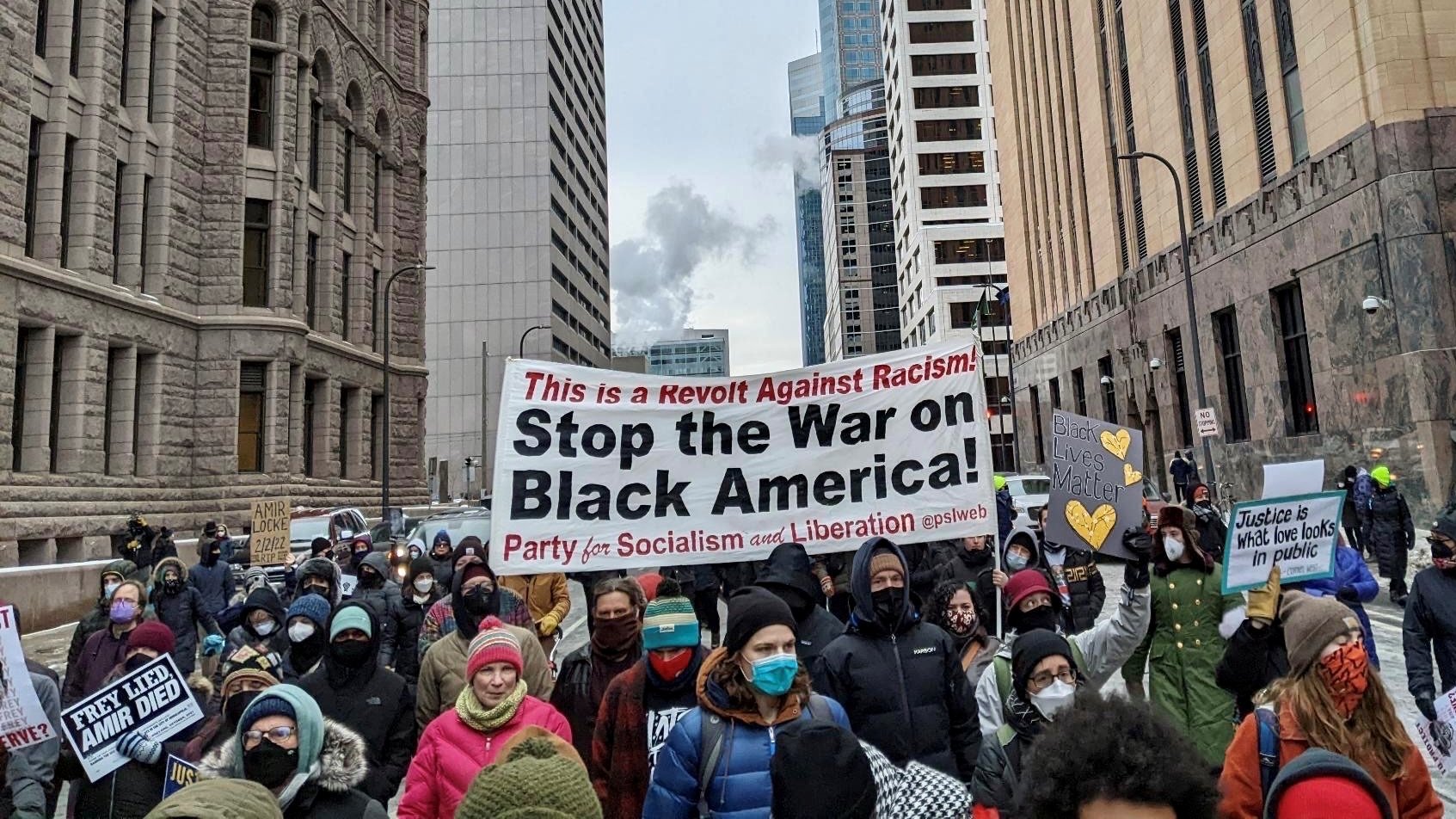This past weekend, thousands in the city of Minneapolis mobilized to demand justice for Amir Locke, a 22-year-old Black man who was fatally shot by police in the early hours of February 2, only seconds after he woke up. Nearly one thousand Minnesotans took to the streets on Saturday, despite sub-zero temperatures, marching from the Hennepin County Government Building to the first police precinct of the city of Minneapolis. On Sunday, a car caravan drove to what is believed to be the home of Interim Chief of Police Amelia Huffman, where they called for her resignation. On Friday, protesters also organized a car caravan.
At the Saturday protest, Andre Locke, Amir’s father, spoke, asking of the Minneapolis Police Department, “Who told you that you were the judge, jury, and executioner?” Amir Locke was not doing anything illegal when he was shot and killed. In the process of executing the controversial practice of a “no-knock warrant”, MPD entered the home in which Amir was sleeping, proceeding to kick the couch where he lay wrapped up in a blanket. Amir reached for a gun, pointing it towards the floor with his finger off the trigger.
According to Jeff Storms, the lawyer representing the Locke family, “It’s very clear that when Amir grabbed the gun he grabbed it in such a manner that he did not know whether or not he would shoot”. Police did not ask Amir to drop his weapon. The moment Amir grabbed the gun, Officer Mark Hanneman shot him three times, fatally.
MPD interim chief Amelia Huffman had claimed that Amir was pointing his gun towards police, and that officers “loudly and repeatedly announced ‘police search warrant’ before crossing the threshold into the apartment.” Recently released body camera footage, however, proved both claims to be false.
Both Huffman and Minneapolis Mayor Jacob Frey held a press conference Thursday night to address the outrage at Amir’s death. Huffman doubled down on her false claims, insisting that those watching the footage “make their own assessment.” Huffman also seemed to defend the actions of police when she said that officers had to “make a split-second decision” upon seeing Amir’s gun, which his family claims he had a license to carry. The conference was interrupted by civil rights attorney and activist Nekima Levy-Armstrong, who called out Huffman’s comments as “the anatomy of a cover-up”. After Levy-Armstrong took action, others in the conference began to demand answers. Attendees asked Frey and Huffman why Amir had been listed as a suspect in a police investigation in an initial press release, when he was not, and why the police released pictures of Amir’s gun which was never fired, and not Hanneman’s gun which fatally shot him. Shortly after being asked these questions, Huffman and Frey exited the press conference without answering.
The shooting has drawn scrutiny to the practice of “no-knock warrants”, or warrants in which the police are not required to knock or announce themselves before raiding a home. This practice runs contrary to the Fourth Amendment of the US Constitution, which is meant to protect US citizens against “unreasonable search”. No-knock warrants became legal in the 1970s, during the inception of the infamous “war on drugs”, after police argued that drug dealers were too dangerous or too liable to destroy evidence for police to announce themselves before entering. Although the practice was intended to be rare, there are now about 20,000 no-knock warrants executed every year in the US, according to Vox News. No-knock warrants have proven to be far more dangerous for the civilians involved than police, and have come under scrutiny especially after the police killing of Breonna Taylor, who was shot in her sleep as police were executing a no-knock warrant in her home.
In a movement that began in Minneapolis after the death of George Floyd, millions took to the streets to demand an end to police killings of Black people. However, after the death of Amir Locke less than two years later, many desire more structural changes. Connecting the death of Amir to deep-rooted history of racist violence in the US, a protester spoke: “the only ones who deserve space and grace are the families, who have had their children mauled down by this murderous-ass, systemic system of policing. The slave patrols, the sundown towns. Enough is enough.”
The genuine uproar and frustration could be heard in the voices of Minneapolis activists who are demanding justice in the death of Amir Locke, the 22-year old Black man who was fatally shot by a SWAT team for the Minneapolis Police Department. #BLM pic.twitter.com/ORchQlE2Qk
— redfish (@redfishstream) February 7, 2022





